人教版高二英语选修6Unit 2 Poems Grammar课件(24张ppt)
文档属性
| 名称 | 人教版高二英语选修6Unit 2 Poems Grammar课件(24张ppt) | 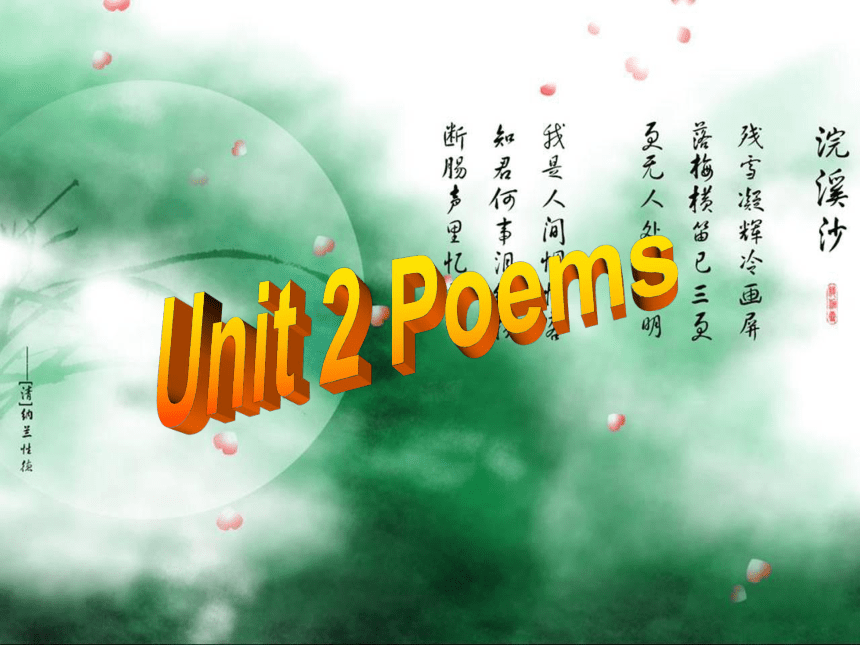 | |
| 格式 | ppt | ||
| 文件大小 | 1.4MB | ||
| 资源类型 | 教案 | ||
| 版本资源 | 人教版(新课程标准) | ||
| 科目 | 英语 | ||
| 更新时间 | 2020-07-27 11:53:12 | ||
图片预览

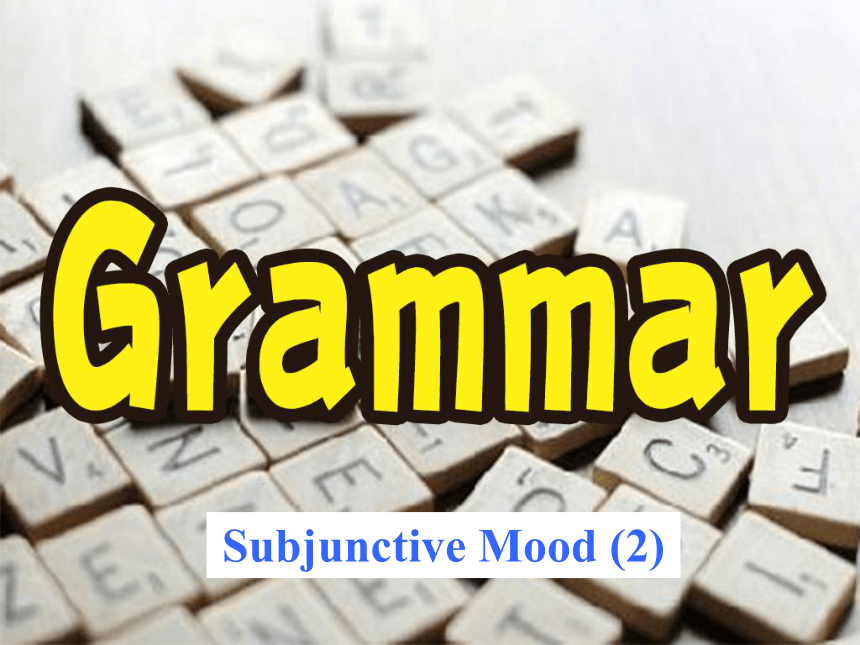
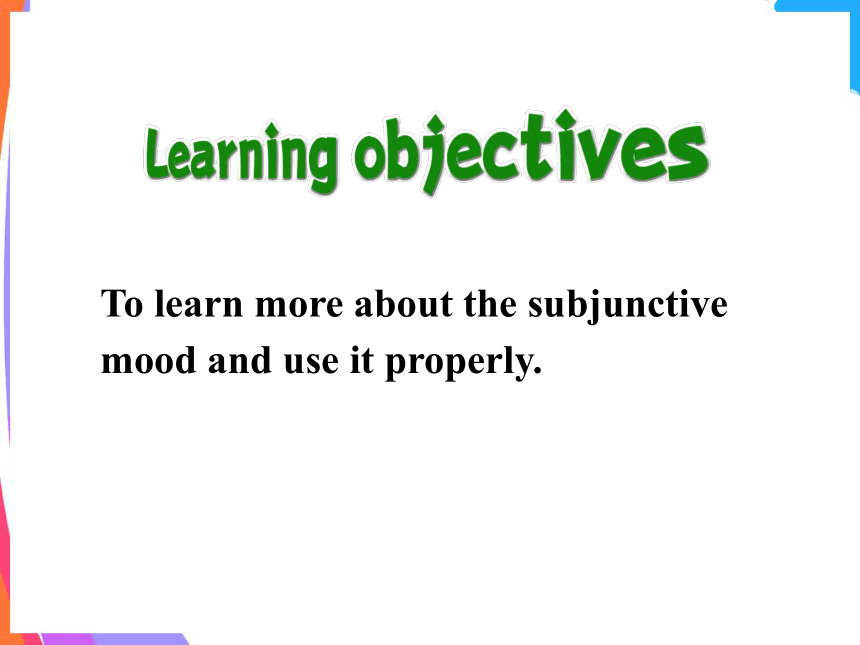
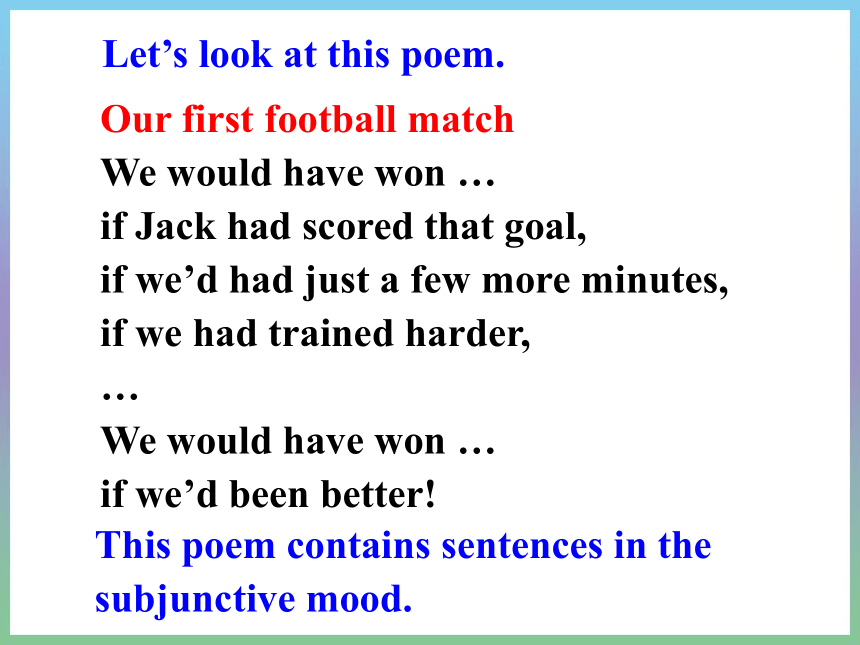
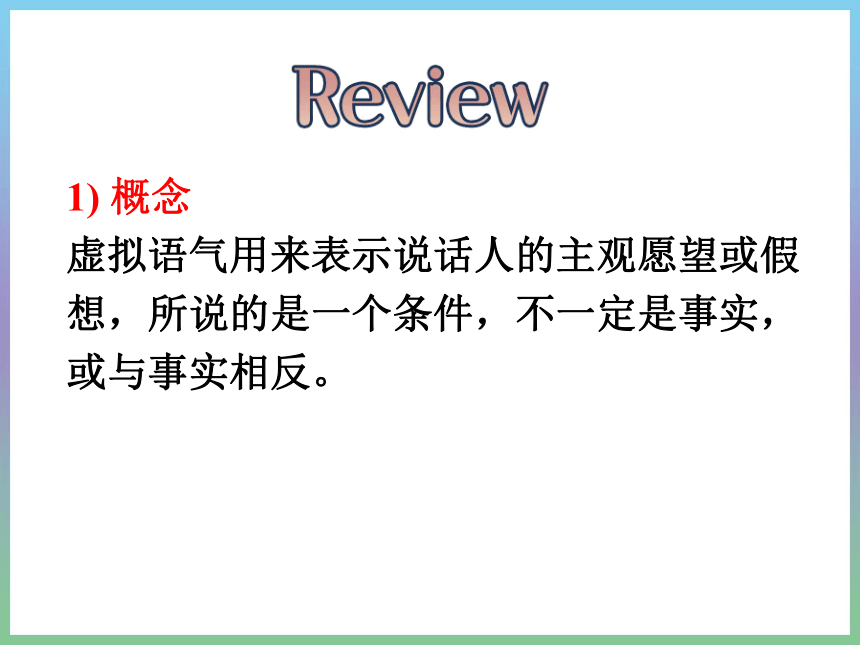
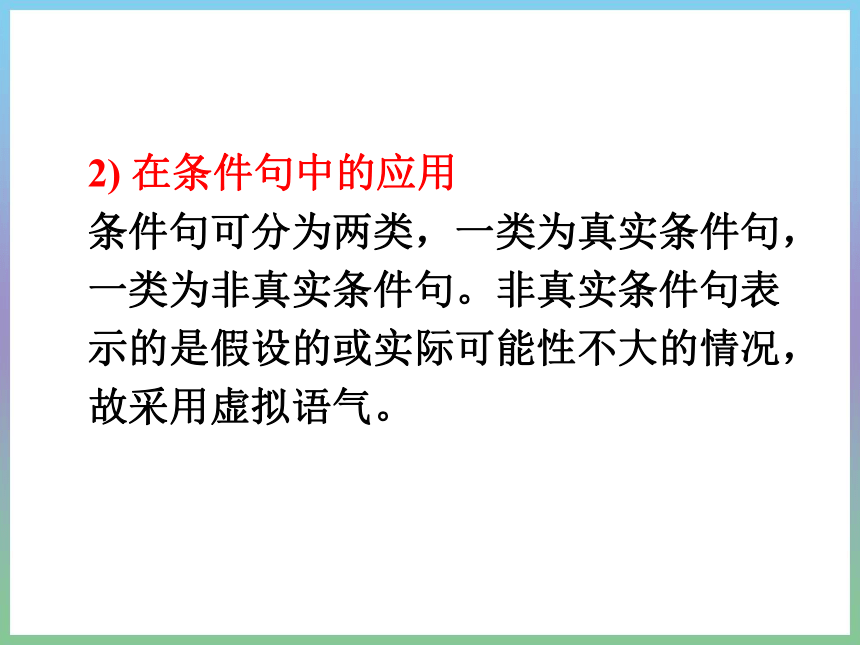
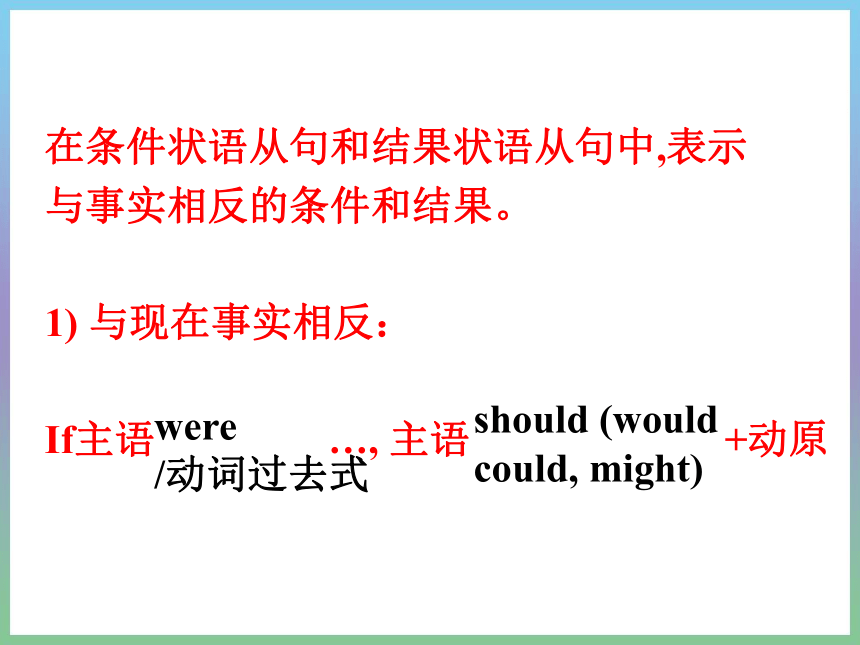
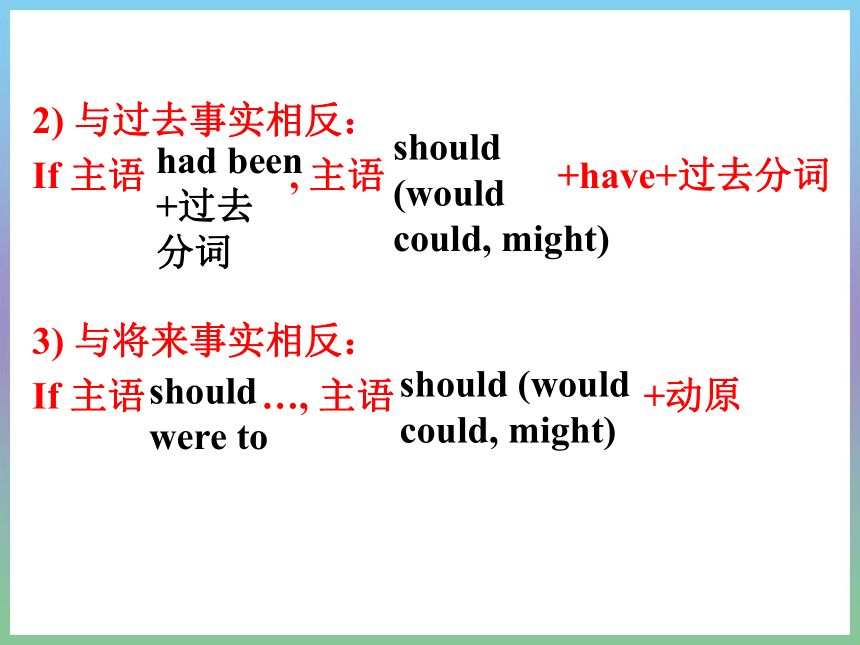
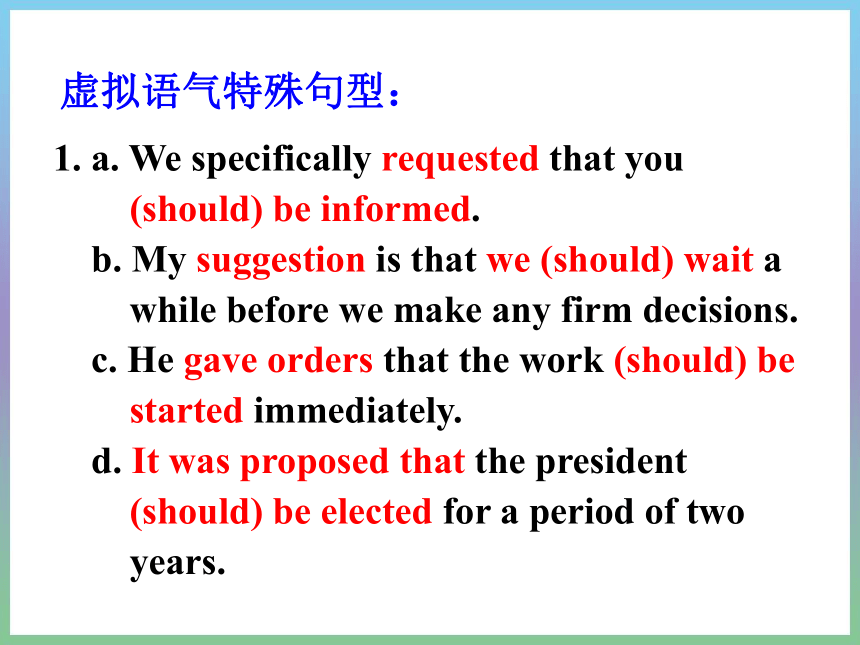
文档简介
Subjunctive Mood (2)
To learn more about the subjunctive mood and use it properly.
Let’s look at this poem.
Our first football match
We would have won …
if Jack had scored that goal,
if we’d had just a few more minutes,
if we had trained harder,
…
We would have won …
if we’d been better!
This poem contains sentences in the subjunctive mood.
1) 概念
虚拟语气用来表示说话人的主观愿望或假想,所说的是一个条件,不一定是事实,或与事实相反。
2) 在条件句中的应用
条件句可分为两类,一类为真实条件句,一类为非真实条件句。非真实条件句表示的是假设的或实际可能性不大的情况,故采用虚拟语气。
在条件状语从句和结果状语从句中,表示
与事实相反的条件和结果。
1) 与现在事实相反:
If主语 …, 主语 +动原
were
/动词过去式
should (would
could, might)
2) 与过去事实相反:
If 主语 , 主语 +have+过去分词
3) 与将来事实相反:
If 主语 …, 主语 +动原
should
(would
could, might)
should
were to
should (would
could, might)
had been +过去
分词
1. a. We specifically requested that you (should) be informed.
b. My suggestion is that we (should) wait a while before we make any firm decisions.
c. He gave orders that the work (should) be started immediately.
d. It was proposed that the president (should) be elected for a period of two years.
虚拟语气特殊句型:
【归纳】
在表示请求、建议、命令、愿望的名词性从句中, 谓语用should +动词原形或只用动词原形。
2. a. I would rather my daughter attended a public school.
b. “Do you mind if I smoke?” “Well, I’d rather you didn’t.”
c. Now I regret going to the cinema with him. I would rather that I had stayed at home.
【归纳】
在____________后的宾语从句中, 谓语常用过去式表示对现在或将来情况的虚拟, 用had+过去分词表示对过去情况的虚拟。
would rather
3. a. It’s (high) time you stopped fooling
around and started looking for a job.
b. It’s (about) time you cleaned your
room!
【归纳】
在It is (high/about) time后的定语从句中, 谓语要用虚拟语气(多用动词过去式表示)。
4. a. If only they would tell me what
they’ve decided.
b. If only I had gone by taxi, then I
could have caught the train.
【归纳】
________(但愿、要是……就好了)主要用在虚拟语气中,用以表达愿望或非真实条件,谓语用过去的某种时态。
If only
5. a. Long live peace!
b. May you enjoy many years of
health and happiness!
c. God bless you!
【归纳】
在一些表示祝愿的话语中用虚拟语气 (多用动词原形)。
【拓展】特殊的虚拟条件句
1.?错综时间条件句:虚拟条件句从句谓语和主句谓语表示的动作在时间上并不一致。如:
If I were a man they would have given me the job.
If you had taken my advice, you wouldn’t be in such trouble now.
2.?含蓄条件句:虚拟的条件有时可以不用条件从句来表示,而是暗含在上下文中。常用来表示含蓄虚拟条件的词或短语有otherwise, without, suppose, but for(要不是)等。如:
We were delayed at the airport. Otherwise we would have been here by lunchtime.
Without my advice, he would have failed.
Suppose you had a million pounds how would you spend it?
But for the rain we would have had a nice holiday.
将句1-句5中的内容与a-e中的内容配对形成完整的一句话(每项限用一次)。
1. If you were rude to the boss,
2. If you lost your job,
3. If you had lost your job,
4. If you hadn’t got a pay rise,
5. If you apologized,
a. you’d be in debt.
b. would you have left the firm?
c. you won’t be dismissed.
d. you’d regret it later.
e. you’d have lost your car as well.
1-d 2-a 3-e 4-b 5-c
1. They might have found a better hotel if they __________(drive) a few more kilometers. (2018 北京)
2. If we ___________(catch) the flight yesterday, we would be enjoying our holiday on the beach. (2018 天津)
3. There is a good social life in the village, and I wish __________(have) a second chance to become more involved. (2018 江苏)
had driven
had caught
had
4. If the new safety system ___________(put) to use, the accident would never have happened. (北京2017)
5. —Do you have Betty's phone number?
—Yes. Otherwise, I ________ (be) able to reach her yesterday. (天津2017)
6. ________ (be) it not for the support of the teachers, the student could not overcome her difficulty. (江苏2017)
had been put
would/could/should/might not have been
Were
1. Review the Subjective Mood.
2. Finish Exercises 2, 3, 4 on page 13.
To learn more about the subjunctive mood and use it properly.
Let’s look at this poem.
Our first football match
We would have won …
if Jack had scored that goal,
if we’d had just a few more minutes,
if we had trained harder,
…
We would have won …
if we’d been better!
This poem contains sentences in the subjunctive mood.
1) 概念
虚拟语气用来表示说话人的主观愿望或假想,所说的是一个条件,不一定是事实,或与事实相反。
2) 在条件句中的应用
条件句可分为两类,一类为真实条件句,一类为非真实条件句。非真实条件句表示的是假设的或实际可能性不大的情况,故采用虚拟语气。
在条件状语从句和结果状语从句中,表示
与事实相反的条件和结果。
1) 与现在事实相反:
If主语 …, 主语 +动原
were
/动词过去式
should (would
could, might)
2) 与过去事实相反:
If 主语 , 主语 +have+过去分词
3) 与将来事实相反:
If 主语 …, 主语 +动原
should
(would
could, might)
should
were to
should (would
could, might)
had been +过去
分词
1. a. We specifically requested that you (should) be informed.
b. My suggestion is that we (should) wait a while before we make any firm decisions.
c. He gave orders that the work (should) be started immediately.
d. It was proposed that the president (should) be elected for a period of two years.
虚拟语气特殊句型:
【归纳】
在表示请求、建议、命令、愿望的名词性从句中, 谓语用should +动词原形或只用动词原形。
2. a. I would rather my daughter attended a public school.
b. “Do you mind if I smoke?” “Well, I’d rather you didn’t.”
c. Now I regret going to the cinema with him. I would rather that I had stayed at home.
【归纳】
在____________后的宾语从句中, 谓语常用过去式表示对现在或将来情况的虚拟, 用had+过去分词表示对过去情况的虚拟。
would rather
3. a. It’s (high) time you stopped fooling
around and started looking for a job.
b. It’s (about) time you cleaned your
room!
【归纳】
在It is (high/about) time后的定语从句中, 谓语要用虚拟语气(多用动词过去式表示)。
4. a. If only they would tell me what
they’ve decided.
b. If only I had gone by taxi, then I
could have caught the train.
【归纳】
________(但愿、要是……就好了)主要用在虚拟语气中,用以表达愿望或非真实条件,谓语用过去的某种时态。
If only
5. a. Long live peace!
b. May you enjoy many years of
health and happiness!
c. God bless you!
【归纳】
在一些表示祝愿的话语中用虚拟语气 (多用动词原形)。
【拓展】特殊的虚拟条件句
1.?错综时间条件句:虚拟条件句从句谓语和主句谓语表示的动作在时间上并不一致。如:
If I were a man they would have given me the job.
If you had taken my advice, you wouldn’t be in such trouble now.
2.?含蓄条件句:虚拟的条件有时可以不用条件从句来表示,而是暗含在上下文中。常用来表示含蓄虚拟条件的词或短语有otherwise, without, suppose, but for(要不是)等。如:
We were delayed at the airport. Otherwise we would have been here by lunchtime.
Without my advice, he would have failed.
Suppose you had a million pounds how would you spend it?
But for the rain we would have had a nice holiday.
将句1-句5中的内容与a-e中的内容配对形成完整的一句话(每项限用一次)。
1. If you were rude to the boss,
2. If you lost your job,
3. If you had lost your job,
4. If you hadn’t got a pay rise,
5. If you apologized,
a. you’d be in debt.
b. would you have left the firm?
c. you won’t be dismissed.
d. you’d regret it later.
e. you’d have lost your car as well.
1-d 2-a 3-e 4-b 5-c
1. They might have found a better hotel if they __________(drive) a few more kilometers. (2018 北京)
2. If we ___________(catch) the flight yesterday, we would be enjoying our holiday on the beach. (2018 天津)
3. There is a good social life in the village, and I wish __________(have) a second chance to become more involved. (2018 江苏)
had driven
had caught
had
4. If the new safety system ___________(put) to use, the accident would never have happened. (北京2017)
5. —Do you have Betty's phone number?
—Yes. Otherwise, I ________ (be) able to reach her yesterday. (天津2017)
6. ________ (be) it not for the support of the teachers, the student could not overcome her difficulty. (江苏2017)
had been put
would/could/should/might not have been
Were
1. Review the Subjective Mood.
2. Finish Exercises 2, 3, 4 on page 13.
